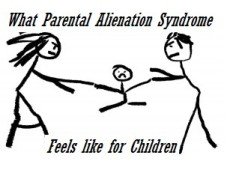What Is Parental Alienation Syndrome?
This is the second post in a 2-part series on domestic violence and children/teens. This week we will focus on Parent Alienation Syndrome. If you want to read the first part of the series, click here.
You’re probably wondering why I am talking about parental alienation syndrome in relation to domestic violence. If you know what the term means, you know that it usually focuses on one parent speaking negatively about the absent parent [usually as a result of divorce] so much so that it negatively affects how the children/teens respond to the absent parent. However, in terms of it relating to domestic violence, it can really be used as another form of aggression.
Parental alienation syndrome [PAS] is also termed domestic violence by proxy because the parent who is alienated parent is further oppressed by the emotional and psychological abuse of the aggressor. For children, this leaves feelings of fear, guilt, and even confusion. Most children who I have worked with have admitted to not knowing whose side to take because the aggressive parent makes sense in demeaning the alienated parent. For children dealing with PAS in a domestic violence situation, it can be described as a mental hijack “where the child’s mind has been forced to prejudicially believe and discriminate against” the alienated parent [Source]. The child must unwillingly side with the alienating parent for fear that they will be turned on next; it sort of looks like Stockholm Syndome [defined here].
PAS in domestic violence looks a little something like this:
The alienating parent [AP] uses domestic violence tactics [such as rejecting, belittling, and isolating] to consciously separate the oppressed parent [OP] from family members and support systems; the AP’s goal is to keep the children away from supporting or helping the OP.
Thinking about it from a child’s perspective, it can be very confusing and really frightening to endure this. However, most of the time children do not receive the help they need because they do not know how to explain what is happening. Also, PAS in domestic violence doesn’t look like normal DV, so even when a child gets the nerve up to attempt an explanation with someone they trust it is often mistaken for parents fighting or an adult disagreement.
The first time that I encountered this dynamic, I have to admit that was what I thought as well. The father did not hit the mother, but the child explained that he was not able to be with his mom alone because the dad felt that the mom would be a bad influence on him. The child explained this to me and did not seem bothered by it. He went on to list the things that his mother did that would negatively influence him [as taught by his father], such as watching too much tv, eating junk food, and engaging in too much leisure. All these things made sense to the my client and he did not realize that this was a form of DV.
PAS in domestic violence leaves terrible scars on the children that have to endure it. The children who are victim of parental alienation syndrome usually grow to have severe emotional and psychological issues due to the guilt they feel about participating in this behavior. Additionally, PAS in domestic violence almost always occurs after the AP no longer has access to the OP [such as after a divorce]. This escalates the fear and guilt of the children involved because they have more than likely witnessed the intimidation and oppression of domestic violence while the OP was living with the family.
Helping a Child Who’s Experienced PAS
If you are a parent who is experiencing PAS, or know of a parent who is, take a look at this tips for helping children/teens get through this experience:
Legal: The best and most effective way to help children [as well as the OP] through PAS is to seek legal advice. Many civil and family law lawyers are familiarizing themselves with the legal terms and laws that govern PAS, especially in domestic violence situations. Help the child by offering to have a session with the OP [if this is possible without causing the AP to be offended] and offer them legal services.
Play/Play Therapy: The most effective way to reach a child is through play. Play is even effective with teens when done with age appropriate items. Through the use of play you can begin to see how the child/teen is processing this situation. If you are a friend or relative, you don’t have to have a degree in psychology. When a child plays what you’re looking for is how he is interacting with the items, his peers, and his environment.
Develop Coping Skill: Working through parental alienation syndrome takes lots of courage and patience. One technique that works when trying to alleviate the effects of PAS is developing a set of coping skills. These skills should focus on building a relationship with your child that is not based on the AP’s portrait of you. You can also begin to be less reactive to the destructive statements the AP is making about you: learn to ignore the statements and work to show your children that you are the same parent you have always been with them. The last coping skill you can develop is taking care of yourself [such as counseling]. This is an ordeal for you as well and you will not be able to help your children through this situation if you are not mentally and emotionally able to help yourself.
While there is not one shoe fits all response to extinguishing PAS in domestic violence, remember that your child’s/teen’s emotional and mental health is at stake. As difficult as it will be, try to be proactive in helping them understand what is going on and helping them navigate through it!
Find out more:





